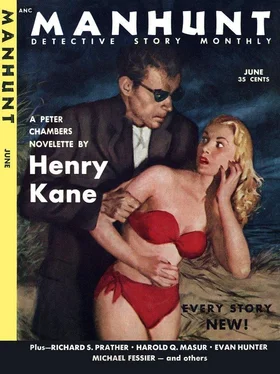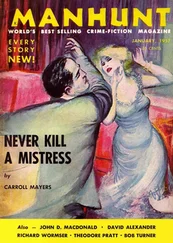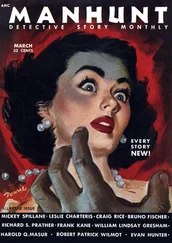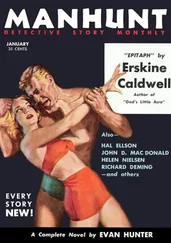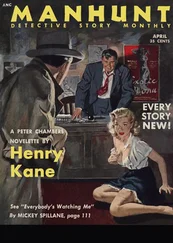Ричард Деминг - Manhunt. Volume 1, Number 6, June, 1953
Здесь есть возможность читать онлайн «Ричард Деминг - Manhunt. Volume 1, Number 6, June, 1953» весь текст электронной книги совершенно бесплатно (целиком полную версию без сокращений). В некоторых случаях можно слушать аудио, скачать через торрент в формате fb2 и присутствует краткое содержание. Город: New York, Год выпуска: 1953, Издательство: Flying Eagle Publications, Жанр: Детектив, на английском языке. Описание произведения, (предисловие) а так же отзывы посетителей доступны на портале библиотеки ЛибКат.
- Название:Manhunt. Volume 1, Number 6, June, 1953
- Автор:
- Издательство:Flying Eagle Publications
- Жанр:
- Год:1953
- Город:New York
- ISBN:нет данных
- Рейтинг книги:5 / 5. Голосов: 1
-
Избранное:Добавить в избранное
- Отзывы:
-
Ваша оценка:
- 100
- 1
- 2
- 3
- 4
- 5
Manhunt. Volume 1, Number 6, June, 1953: краткое содержание, описание и аннотация
Предлагаем к чтению аннотацию, описание, краткое содержание или предисловие (зависит от того, что написал сам автор книги «Manhunt. Volume 1, Number 6, June, 1953»). Если вы не нашли необходимую информацию о книге — напишите в комментариях, мы постараемся отыскать её.
Manhunt. Volume 1, Number 6, June, 1953 — читать онлайн бесплатно полную книгу (весь текст) целиком
Ниже представлен текст книги, разбитый по страницам. Система сохранения места последней прочитанной страницы, позволяет с удобством читать онлайн бесплатно книгу «Manhunt. Volume 1, Number 6, June, 1953», без необходимости каждый раз заново искать на чём Вы остановились. Поставьте закладку, и сможете в любой момент перейти на страницу, на которой закончили чтение.
Интервал:
Закладка:
“You seem to be very uncommunicative today,” Henry finally said. “By the way, boys, is there any little thing I can do for you? Do you, by any chance, want to ask me a question?”
They glared sullenly and hatefully at him, then turned in a body and walked back to their cars. By the time they had reached the road they had regained their voices and they were muttering angrily among themselves.
Later on, the same delegation called on Sheriff Ben Hodges. They were thoroughly aroused now and they demanded that the sheriff do something about ridding the county of a known criminal who might at any moment turn out to be a menace to the peace and security of them all. Sheriff Ben was a big man and some of his weight was fat. He was well-disposed and given to indolence, being more inclined to sit in his easy chair and read books than militantly and actively to perform the duties required of his office. He had maintained his job throughout the years by giving the appearance of agreeing with everybody about everything and never taking sides in a public controversy. This time, however, he felt that he had to make a stand.
“Well, now,” he said mildly, “as for that kid being a menace, I’m not so sure. You see he’s a distant kin of Henry’s — son of a cousin on his mother’s side, I think — and Henry had him pretty thoroughly investigated before he took him in. Claude lived all his life in the city where they burn coal to make steel and the only patch of green he ever saw was in the public park where the police had signs forbidding him to walk on the grass. One hot evening, when the air was moist and full of smoke and soot, some boys his own age drove by in a car. They had girls with them and they took Claude along for a ride in the country. It turned out that the car had been stolen and Claude was convicted of complicity in the crime.” Sheriff Ben spoke as persuasively as he knew how, trying to make them understand so’s not to have trouble with them. “I know,” he conceded, “that Claude probably had sense enough to realize that those other boys really didn’t own that automobile, but, still in all, when a kid’s hungry for a breath of country air, he isn’t going to be too particular how he gets it, is he?”
The delegation didn’t understand and what’s more, they didn’t believe Sheriff Ben’s version of Claude’s crime. Rumor had given them an uglier and more interesting version and they preferred to believe that. They resented Sheriff Ben’s attempt at cleaning up Claude’s character. Claude was a criminal, they said, and, if the sheriff wanted to, he could find some sort of a pretext to run him out of the community. The implication was that, if the sheriff appreciated which side his bread was buttered on, he would do what was required of him. Sheriff Ben understood the implication. He had eaten the public’s bread for many years and sometimes it had a bitter taste; it was buttered with humiliation. On this day he had no appetite for it, and he made the political mistake of openly antagonizing a group of representative citizens.
“As for being a criminal,” he said, “sometimes that’s a state of mind and the result of circumstances. I don’t suppose that there’s many of us here who, at one time or another, couldn’t have been in Claude’s shoes. During prohibition, for instance, some of you farmers made hard liquor and some of you merchants sold it. Most of us drank it and I, being sheriff, violated my sworn oath by overlooking it.” He stared steadily and defiantly at them. “That isn’t all I’ve overlooked,” he said, “and some of you wouldn’t like it if I got more specific. In any event there’re darned few of us who, according to the strict letter of the law and with a little bad luck, couldn’t have a prison or a jail record hanging over us.”
He rose and waved a heavy hand in dismissal.
“Come to see me again, gentlemen,” he said. “As you know, I am always at your services. But the next time you come to me about that kid, who’s working ten hours a day for a chance at a decent way of life, I’d appreciate it kindly if you’d have more to go on than your prejudices.”
The delegation clumped angrily out of the office and Sheriff Ben realized that he had seriously jeopardized a job that perhaps he didn’t deserve and, with it, the money he didn’t at all times earn.
After that the citizens of Green Valley sullenly accepted Claude’s presence among them. They didn’t offer him any physical harm; no individual would have thought of it, excepting Orry Quinn, and he, being a coward, would not have risked the attempt. They simply ignored Claude and, excepting for Henry Rankins and Sheriff Ben, the kid didn’t have a friend or a speaking acquaintance in the community until Laura Hannifer came along. Laura was the only child of one of the oldest families in Green Valley. Her parents had pampered her a great deal and, because she had a will of her own, she was considered arrogant. She had just recently returned home from a visit with relatives in another part of the state, and one day she rode her horse up to Henry Rankins’ house and got off and sat on the porch with him.
“Hello, Uncle Hank,” she said to Henry, who was no kin of hers, “I just dropped in for a glass of milk and to stick my nose into your business. I understand you’re harboring a dangerous criminal hereabouts.”
“I sure have,” said Henry, grinning at her. “A regular killer-diller.”
“Good for you,” said Laura. “I’ve been hearing about him and I understand that the citizens of our community don’t like him. Well, anybody these people around here don’t like has a long running start toward being my pal. I don’t like most of them, either.”
Then Claude Warren, his face smudged with grease from his working on the tractor, came around the corner of the house and stood staring at Laura as if he’d never seen a girl before. Certainly he’d never seen a girl so healthy and tanned and with such golden hair and with such a friendly look in her eyes.
“Hi, Dirty-face,” she said gaily to him. “Come on over and sit a spell.” As he stood and goggled at her she laughed at him. “Don’t be bashful,” she said. “I came over here just to see you. Robbed any interesting banks lately?”
Her grin was so infectious and friendly that he grinned back at her and finally obeyed her command and sat beside her on the porch. Henry departed to get a glass of milk and, when he returned, Laura had already succeeded in thawing Claude out. He was talking to her, a little embarrassed, but with the eagerness of a kid who has long been starved for companionship.
It might have been sympathy and understanding on Laura’s part at first, but it soon grew beyond that and presently everybody in Green Valley was discussing the outrageous carryings-on of Laura Hannifer with the ex-convict. The carryings-on weren’t very spectacular. After attending a village dance and being frozen cold by the others, Claude and Laura contented themselves with hunting and fishing and riding horses together, and, in order to give Claude time for that, Laura helped him with his chores around Henry’s place. The mere fact that Laura kept company with Claude, however, constituted a howling scandal.
Ramsey Hannifer and his wife did their best to break up the affair. At first they pleaded with Laura, and then they threatened all sorts of punishment, but she defied them. She loved Claude, she declared, and she intended to marry him one day. Any interference from them, she told them, would only succeed in hastening the event. They knew her well enough to realize that she meant business. Finally, in the hopes that the whole thing was merely infatuation on Laura’s part and that eventually she would come to her senses, they ceased to offer any open opposition to the affair. They had, however, a definite plan of action which they intended to adopt in case the thing went too far.
Читать дальшеИнтервал:
Закладка:
Похожие книги на «Manhunt. Volume 1, Number 6, June, 1953»
Представляем Вашему вниманию похожие книги на «Manhunt. Volume 1, Number 6, June, 1953» списком для выбора. Мы отобрали схожую по названию и смыслу литературу в надежде предоставить читателям больше вариантов отыскать новые, интересные, ещё непрочитанные произведения.
Обсуждение, отзывы о книге «Manhunt. Volume 1, Number 6, June, 1953» и просто собственные мнения читателей. Оставьте ваши комментарии, напишите, что Вы думаете о произведении, его смысле или главных героях. Укажите что конкретно понравилось, а что нет, и почему Вы так считаете.
